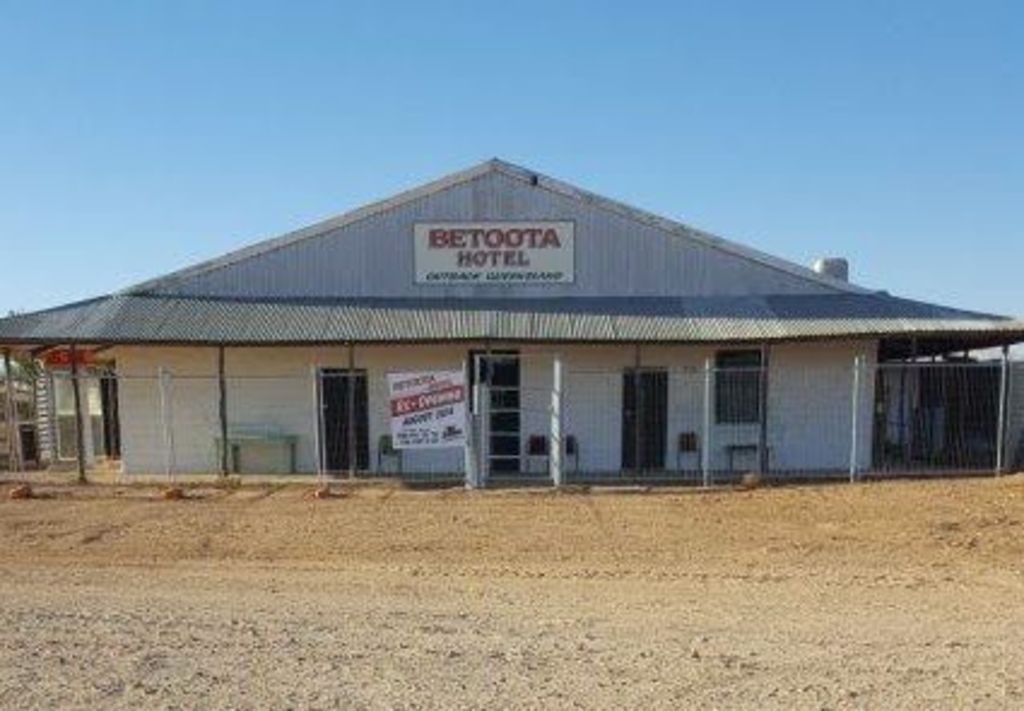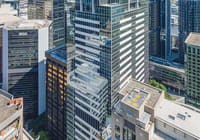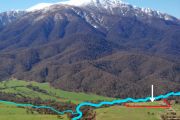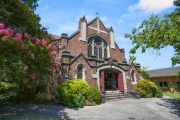
Betoota Hotel in deserted outback town set to reopen after more than a decade
Thirty years ago, car smash repair man Robert Haken first visited the tiny town of Betoota on the vast, deserted gibber plain in outback Queensland.
Once known as Australia’s smallest town, with a population of one, it has only one building – the 96-year-old Betoota Hotel – which also happens to be the only structure on the 400-kilometre dirt road between Windorah and Birdsville.
He’s never forgotten it though. He had a few beers and a chat with the hotel’s eccentric Polish migrant owner Simon “Ziggy” Remienko, the town’s one resident, who then agreed to pump him some petrol from the hotel’s single bowser.
“But then along came a Range Rover with a very impatient idiot at the wheel who kept telling us to get a hurry on,” says Haken, now 55. “Simon took his time and very, very slowly served me, took my money and then went back to the bowser, raised the price of petrol by 20 to 30 cents and then agreed to serve him. He was such a character!”
Since then, Haken’s never been able to get the scene out of his mind and now he finally has the chance to revisit those memories – permanently. With Remienko dead now for 14 years, the town population down to nought and the pub all shut up, Haken’s just done the unthinkable, and bought the hotel along with two partners “for a gift of a price” from Birdsville Pub owners David Brook and Kim Fort, who were given it by Remienko before his death.
“We wish him all the best as it will be hard work with no power and no water,” says David Brook’s wife Nell. “It will require a lot of energy but it’s good he’s got the get up and go, and is willing to take it on. Good on him! We hope it will go well.”
Currently with his own business in Logan, Queensland, and with a property he runs in Glenmorgan 15 hours away east by road, Haken is now busy restoring the hotel with the two partners. After it opens in August he plans to spend every winter in Betoota, offering fuel, vehicle and caravan repairs, beds for tourists – particularly for grey nomads – food and a breakdown service.
“I think it’s an absolutely fantastic thing, I can tell you,” he says. “It’s one of those things that happens that you don’t think ever will. I feel quite overwhelmed by it all actually.”
With the nearest town, Birdsville, 180 kilometres away, and as the last stop on the long journey through the desert to the Birdsville Races, he imagines he could be a very popular man.
“I’ll only be there in the winter. No one’s around there in the summer when the temperature can get as high as 55 degrees,” he says.
“But I like that style of outback living and the hotel was just sitting there with no one showing any interest. There’s nothing out there but gibber country and bull dust so I’ll be offering people a great opportunity to have a rest, a cup of tea or a cold beer and a stay overnight.
“Then there’s also the Betoota Races, the first cab off the rank for the racing season in August, when I plan to open, and I’m excited to help promote that. I’ve met the racing club president and secretary and they’re very keen to see someone here.”
Everyone living in the massive Diamantina Shire is thrilled to see the hotel reopening too. At Mount Leonard Station, caretaker Margaret Foster says, “We’re all very excited.
“It’ll mean a fuel and mechanical repair stop approximately in the middle of the 400-kilometre road from Windorah to Birdsville, which’ll be very good for travelling tourists. And he does seem the right man for the job.”
The Betoota Hotel is legendary for its extreme isolation, being established in 1885 as a customs post for cattle going south to market and was also a sanctuary for men working on the rabbit-proof fence in the early 1900s. Its name also inspired the creation of the popular satirical online newspaper The Betoota Advocate.
In outback circles, it was also well-known for the irascibility of its former owner. The last boxing tent showman Fred Brophy remembers the time he pulled up, hot and thirsty after a long drive with his troupe.
“The pub looked like a fortress, with sandstone walls more than a third of a metre thick, and it was tiny inside with only enough room to hold about eight people,” he says. “The bar counter was a metre wide, and behind it was old spirit bottles covered in dust and cobwebs.”
Brophy ordered beer and asked if he could have fuel. Remienko looked at him blankly and asked him if he wouldn’t prefer to have more beers first. Brophy agreed, called for another round, and then the owner agreed to serve him some fuel.
“Simon unlocked the bowser, and pumped it up to fill my truck, not saying a word, ignoring the two 4WDs now waiting, and walked back into the pub, picked up his calculator, and multiplied 55c per litre multiplied by however many litres he’d put in, and told me $120.
“At that time, petrol was 22c a litre, but I couldn’t even manage to work out the gallons from the litres. So I just laughed and gave him the money and asked for another round.”
He then refused to serve the 4WDs waiting as they didn’t want drinks and only had credit cards no cash … Remienko only ended up retiring in 1997 after nearly 50 years behind the bar, but carried on living there until 2004 when he finally died, aged 88, and the population of the town went down to zero.
Haken says he won’t be emulating his forerunner’s style. “I don’t think I’ll be serving people like Simon used to,” he says. “I’d be hanged if I did, I reckon!”
And what does his wife think about his decision to buy the place and will she be happy to go to live there?
He laughs. “If I had a wife she would be, I reckon,” he says. “But when you do absolutely crazy things like buying the Betoota Hotel, it would be hard to have a woman in tow.”












